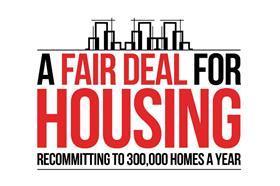Group says development will tail off without support

The largest housing associations in London have warned their development output could drop by a third unless they receive extra government support.
The G15 group, whose members collectively built 11,600 homes in 2021/22, said restrictions to rent rises, increased borrowing costs and the need to divert money towards improving existing homes and meeting building safety requirements mean future development is likely to fall sharply.
The group, which manages 770,000 homes, added that a previous three-year rent freeze, plus a 7% rent cap, agreed shared ownership rent caps and the scrapping of rules on rent convergence – under which association rents are brought into line with council rents – has led to a £6.6bn loss in investment since 2016.
It says a further £12.4bn in “reinvestable resources” will be lost over the course of members’ 30-year business plans.
The G15, in its submission to the levelling up, housing and communities committee’s inquiry into social housing sector finances, warned that many of its members will reduce development spend to prioritise investment in improvements to existing properties.
Housing associations are facing pressure to invest in improving existing properties, with the Social Housing Regulation Bill imposing new consumer rules from next year, alongside the need to invest in retrofit and meeting building safety standards.
The G15 is calling for the government to introduce a raft of measures to support associations to build.
Its asks include a long-term rent settlement for the sector, grant funding for regeneration, rules requiring the release of land for affordable housing and the removal of VAT on housing association activity (see box below).
Geeta Nanda, chair of the G15 and chief executive of Metropolitan Thames Valley, said associations’ “capacity is being put under growing pressure” due to funding costs and rent caps.
She added: “We need a proper conversation about how the priorities we all share are going to be achieved in the coming years.
“Investment in existing homes is rightly the first priority, but without housing associations’ contribution to building new affordable homes, issues like overcrowding aren’t going to be dealt with, which in turn impact the conditions of existing homes.
“It’s too simplistic to suggest we can pick investment in existing homes over new build – we need both.”
>> See also:
>> See also:
Nanda said a long-term plan for social housing is “desperately needed.”
She said: “Housing associations build almost 1 in 4 new homes, and if we reduce our programmes to meet costs like building safety and retrofit, I am really worried that the gap won’t be filled and it’s people in dire housing need that will suffer.”
The G15 is a supporter of �ڶ�����’s sister title Housing Today’s calling for the government to re-commit to building 300,000 homes a year. The campaign is calling for solutions to enable the entire housebuilding sector, including housing associations, to build more homes.
G15 policy asks
Here are the G15’s asks of government in its own words:
• Long-term rent settlement: a long-term approach to secure the financial future of the sector and maintain affordability for residents, will give greater confidence to investors and lenders of the future viability of the sector, enabling members to invest in key priorities.
• Reintroduction of rent convergence: the reintroduction of the previous rent convergence mechanism should be a starting point for the post-2025 rent settlement.
• Specific grant funding for regeneration: reintroducing specific grant funding for regeneration to support the replacement of existing homes that are no longer fit for purpose and to enable wider community investment is essential.
•A fit for purpose Decent Homes Standard (DHS) supported by funding: it is vital that, once the DHS has been updated, its implementation is supported by additional funding to help providers to bring their existing stock into line with the new requirements.
• A requirement to release land for affordable housing: this should be considered to make better use of publicly owned land to support affordable home delivery.
• Remove VAT on housing association activity: the irrecoverable VAT of one typical G15 member is £30m per annum. The estimated costs of irrecoverable input VAT for the sector are £1bn-2bn per annum, severely restricting the extent to which we can borrow to fund new affordable housing and invest in key areas without breaching loan covenants.
• Recycled Capital Grant Fund (RCGF) flexibilities: we are calling for the RCGF to be ‘rolled-over’ to support development activity, and how it can be used is broadened to further support providers through the current challenges.
Source: G15 submission to the levelling up, housing and communtiies select committee’s inquiry into social housing sector finances


























No comments yet